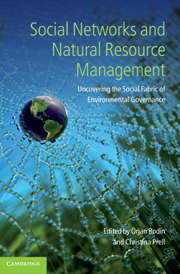 Social Networks and Natural Resource Management
Social Networks and Natural Resource Management Book contents
- Frontmatter
- Contents
- Contributors
- Foreword
- Part I Introduction
- Part II Case studies
- 4 Barriers and opportunities in transforming to sustainable governance: the role of key individuals
- 5 Social network analysis for stakeholder selection and the links to social learning and adaptive co-management
- 6 Who and how: engaging well-connected fishers in social networks to improve fisheries management and conservation
- 7 The effects of social network ties on the public’s satisfaction with forest management in British Columbia, Canada
- 8 Social network models for natural resource use and extraction
- 9 Friends or neighbors? Subgroup heterogeneity and the importance of bonding and bridging ties in natural resource governance
- 10 The role of individual attributes in the practice of information sharing among fishers from Loreto, BCS, Mexico
- 11 Transformative collective action: a network approach to transformative change in ecosystem-based management
- 12 Social networks, joint image building, and adaptability: the case of local fishery management
- 13 Agrarian communication networks: consequences for agroforestry
- Part III Summary and outlook
- Index
- References
10 - The role of individual attributes in the practice of information sharing among fishers from Loreto, BCS, Mexico
from Part II - Case studies
Published online by Cambridge University Press: 05 June 2012
- Frontmatter
- Contents
- Contributors
- Foreword
- Part I Introduction
- Part II Case studies
- 4 Barriers and opportunities in transforming to sustainable governance: the role of key individuals
- 5 Social network analysis for stakeholder selection and the links to social learning and adaptive co-management
- 6 Who and how: engaging well-connected fishers in social networks to improve fisheries management and conservation
- 7 The effects of social network ties on the public’s satisfaction with forest management in British Columbia, Canada
- 8 Social network models for natural resource use and extraction
- 9 Friends or neighbors? Subgroup heterogeneity and the importance of bonding and bridging ties in natural resource governance
- 10 The role of individual attributes in the practice of information sharing among fishers from Loreto, BCS, Mexico
- 11 Transformative collective action: a network approach to transformative change in ecosystem-based management
- 12 Social networks, joint image building, and adaptability: the case of local fishery management
- 13 Agrarian communication networks: consequences for agroforestry
- Part III Summary and outlook
- Index
- References
Summary
Introduction
A weak regulatory regime, high resource-dependent livelihoods, poor development of social organization, extreme poverty, and signs of over-exploitation of extensive fishery resources characterize the fisheries system in the Loreto area. Fishers have not developed their own institutions to control the access and use of fishery resources, and government fisheries institutions have failed to prevent resource degradation. This would appear to be the familiar tragedy of the open-access situation that many scholars have used to describe the degradation of fishery resources by fishers competing to extract the last fish from the oceans (Ostrom et al., 1994). However, paradoxically, cooperation rather than competition seems to characterize the access to fishery resources in the Loreto area. Indeed, fishers in the Loreto area use trustworthy personal contacts to find out about the abundance of fish resources in adjacent and distant waters to decide where and when to fish (Ramirez-Sanchez, 2007; Ramirez-Sanchez and Pinkerton, 2009).
- Type
- Chapter
- Information
- Social Networks and Natural Resource ManagementUncovering the Social Fabric of Environmental Governance, pp. 234 - 254Publisher: Cambridge University PressPrint publication year: 2011
References
- 6
- Cited by


